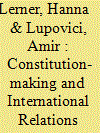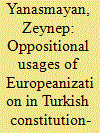| Srl | Item |
| 1 |
ID:
169262


|
|
|
|
|
| Summary/Abstract |
Constitution-making has become an intrinsic component of international politics, nevertheless, international relations scholars largely refrain from theorizing it tending to view formal constitutional drafting as a domestic project. The article proposes an understanding of constitution-making as an international (in addition to national) political phenomenon. We develop a new and comprehensive classification of international influences on constitution-making. We also demonstrate how the empirical study of constitution-making can illuminate overlooked areas of research and challenge existing international relations theories. Our focus here is on the study of international norms. We present three theoretical insights concerning the emergence of international norms, their dissemination, and the role of epistemic communities in facilitating their expansion. We conclude by highlighting how the interaction between international and domestic factors in the crafting of constitutions further challenges the disciplinary distinction between domestic and international politics.
|
|
|
|
|
|
|
|
|
|
|
|
|
|
|
|
| 2 |
ID:
145175


|
|
|
|
|
| Summary/Abstract |
The United Nations-led constitution-making process, while highly controversial, has sought to create an opening to help Somalia transition to a new phase in its political development. This article considers the structural features, problems, and opportunities of the process, particularly in the context of debates over external interventions and state sovereignty. It also addresses an area that is often overlooked during constitution-making: the role of media and communications in advancing narratives that not only shape perceptions, but also define the scope of the debate. International actors have worked to promote legitimating narratives, emphasizing certain aspects and values with a focus on the constitution being ‘Somali-owned’. This article shows how local and private media treated and reshaped these emphases and priorities. At this stage it is not possible to conclude whether efforts to “sell” the constitution have generated greater legitimacy, but what is clear is that the narratives that have dominated public discourse have been focused on participation and politicking, reflecting underlying concerns about which groups will have access to state resources, as well as responding to the interventions by international actors. This emphasis has obscured the role of local legal cultures and previous experiences with grassroots constitution-making processes and reconciliation in the Somali territories that might allow for the reimagining of the nation.
|
|
|
|
|
|
|
|
|
|
|
|
|
|
|
|
| 3 |
ID:
094490


|
|
|
| 4 |
ID:
156096


|
|
|
|
|
| Summary/Abstract |
The European Union has traditionally played an anchoring role in Turkey, pushing the Republic towards the enhancement of fundamental rights and freedoms. However, the decreasing credibility of the project for EU membership after 2005 has gradually led to selective reforms being introduced, and most recently to de-Europeanization. Against this quickly changing background, this paper seeks to investigate the usages of Europeanization by domestic political actors during the discussions on the recently failed constitution-making process (2011–2013). It specifically focuses on deliberations over religious freedom, and argues that Europeanization has continued to serve as the normative context in constitution-writing.
|
|
|
|
|
|
|
|
|
|
|
|
|
|
|
|